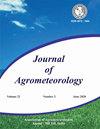气候变化对印度奥里萨邦Mayurbhanj地区农业流域未来作物需水量的影响
Q3 Agricultural and Biological Sciences
引用次数: 0
摘要
气候变暖和人为气候变化是降雨模式、水文过程、流量、地下水位、水资源可用性以及极端水文气候(干旱、洪水、热浪)的频率和强度变化的全球驱动因素,也可能影响水质、农业生产力、粮食安全、社会经济发展,以及地方和区域各级的社区复原力(IPCC,2021)。尽管雨养农业在印度最为普遍,但许多地方也采用地表和地下水资源灌溉,以满足日益增长的生产需求,例如在非雨季。特别是由于作物蒸散和灌溉需求取决于当地气候(温度、降雨量、蒸散等因素),因此还需要在区域背景下调查气候变化对农业活动和灌溉用水需求的影响。因此,有必要了解和评估气候变化对不同资源系统的影响,并通过可持续实践来适应未来气候的不确定性(Rehana和Mujumdar,2013;Aswathi等人,2022;Abraha和Hagos,2022)。基于区域层面的研究和分析,通过采用综合资源管理、精准农业和灌溉调度决策支持系统,农业社区未来的可持续水管理是可能的。本文章由计算机程序翻译,如有差异,请以英文原文为准。
Impacts of climate change on future crop water demand in an agricultural watershed in Mayurbhanj district of Odisha, India
warming and anthropogenic climate change are global drivers of changes in rainfall pattern, hydrologic processes, streamflows, groundwater level, water resources availability, and frequency and intensity of hydroclimatic extremes (droughts, floods, heat waves), and are also likely to impact water quality, agricultural productivity, food security, socio-economic development, and community resilience at local-to-regional levels (IPCC, 2021). Though rainfed agriculture is most prevalent in India, irrigation using surface and groundwater resources is also practised in many places to meet the growing demands of production, for instance, in non-rainy (Rabi) season. Especially since the crop evapotranspiration and irrigation demand depend on local climate (temperature, rainfall, evapotranspiration, among other factors), the impacts of climate change on agrarian activities and irrigation water requirement also need to be investigated in a regional context. Hence, it is necessary to understand and evaluate the impacts of climate change on the different resource systems and to adapt to the uncertainties of future climate by means of sustainable practices (Rehana and Mujumdar, 2013; Aswathi et al., 2022; Abrha and Hagos, 2022). Sustainable water management in future in agricultural communities can be possible by adopting integrated resources management, precision agriculture, and decision support systems for irrigation scheduling, based on regional level studies and analyses.
求助全文
通过发布文献求助,成功后即可免费获取论文全文。
去求助
来源期刊

Journal of Agrometeorology
农林科学-农艺学
CiteScore
1.40
自引率
0.00%
发文量
95
审稿时长
>12 weeks
期刊介绍:
The Journal of Agrometeorology (ISSN 0972-1665) , is a quarterly publication of Association of Agrometeorologists appearing in March, June, September and December. Since its beginning in 1999 till 2016, it was a half yearly publication appearing in June and December. In addition to regular issues, Association also brings out the special issues of the journal covering selected papers presented in seminar symposia organized by the Association.
 求助内容:
求助内容: 应助结果提醒方式:
应助结果提醒方式:


